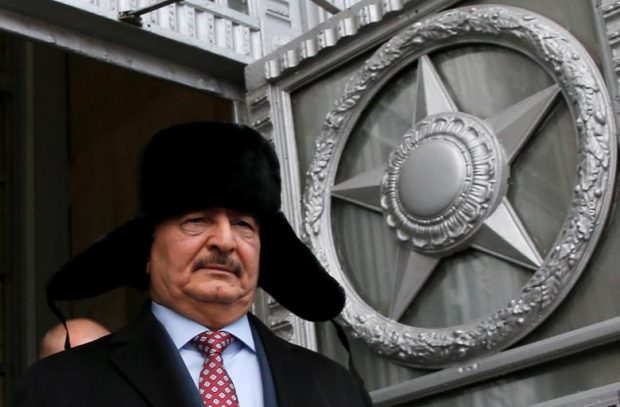Haftar aims at Russian ties in oil sector, report says

In a sign that Libya’s powerful military is moving closer to Russia, so-called Libyan National Army (LNA) commander Khalifa Haftar—the man responsible for recapturing the country’s oil ports and essentially restarting production—is meeting top officials in Moscow.
Haftar is the key political and military rival to the Western-backed central government in Tripoli, and his trip to Russia indicates a fragile game of alliances that could upset the delicate balance of control over Libyan oil.
Last weekend’s was not Haftar’s first visit to Moscow: he had visited Russia at least twice in the past year, and has been forging friendly relations with Moscow, while the U.S. is supporting the increasingly weakened internationally recognized Government of National Accord (GNA).
During Haftar’s meeting with Russia’s Defense Minister Sergei Shoigu this past weekend, “Special attention was paid to situation in the North Africa focusing on situation in Libya. The parties stressed the importance of dialogue and agreed to continue contacts, Russia’s Defense Ministry said.
Russian Foreign Minister Sergey Lavrov also welcomed Haftar, saying that “Russia actively supports the tentative revival of a political settlement and the complete recovery of statehood by your country.”
On Monday, Haftar said in Moscow that troops under his command had taken control over Libya’s second-biggest city, Benghazi, which is close to many oil fields and is an oil infrastructure hub.
“We expect to continue this struggle until the Libyan National Army takes control of Libya’s entire territory in order to ensure stability and security,” Haftar said, as quoted by Stars and Stripes, the daily published for the U.S. military.
Haftar’s LNA recaptured Libya’s key ports in the east in September last year, and handed control over them to the National Oil Company (NOC), and crude exports were resumed after a two-year blockade by the Petroleum Facilities Guard (PFG)—an armed group affiliated at the time with the UN-backed Libyan government. The PFG had used its control to extract money from various authorities.
Factional fighting at some ports returned in March this year, and a rival faction seized the terminals for a few days, but Haftar’s LNA had reclaimed the ports by mid-March.
No major fights over port facilities have been recorded since then, which allowed the North African country to restore its crude oil production to over 1 million bpd for the first time in four years.
In July, Libya’s average production topped 1 million bpd, as per OPEC secondary sources, with the North African producer exempt from the cuts raising output by 154,300 bpd from June and accounting for most of the total OPEC production rise.
(Source: OilPrice)
How to submit an Op-Ed: Libyan Express accepts opinion articles on a wide range of topics. Submissions may be sent to oped@libyanexpress.com. Please include ‘Op-Ed’ in the subject line.
- Libya’s Supreme Court affirms LARMO authority - December 19, 2024
- Libya’s Central Bank moves to calm currency concerns - December 18, 2024
- Syria: Alawites between fear and hope after Assad’s fall - December 17, 2024


